You are currently browsing the tag archive for the ‘MDOT’ tag.
The Michigan Department of Transportation, in cooperation with the city of Ann Arbor, will soon install a new High-intensity Activated crossWalK (HAWK) signal at the corner of I-94 Business Loop (Huron Street) and Third/Chapin Street in downtown Ann Arbor. This will be the first HAWK-style traffic control device on a state trunkline in Michigan. There are several such signals already in existence throughout the state on local streets, including in Detroit and Oakland County.
A HAWK signal provides a protected pedestrian crossing as a way to increase safety. It is used only for pedestrian crossings. It does not control traffic on side streets.
When you wish to cross the street, you push a button activating the HAWK signal. A flashing yellow light warns drivers approaching the crosswalk of a pedestrian wishing to cross. The flashing yellow light is followed by a solid yellow light telling drivers to prepare to stop.
The signal then changes to a solid red for drivers to stop at the intersection. At this point, you can cross safely. The solid red signal will then convert to a flashing red signal after a predetermined amount of time, telling drivers to proceed through the intersection when it is clear and safe to do so.
The HAWK signal will then go dark. Drivers can continue through the intersection without stopping until the button is again activated.
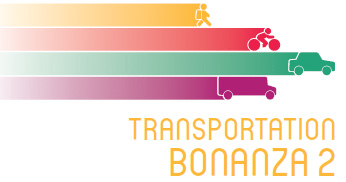 The Michigan Association of Planning, in partnership with the Michigan Department of Community Health, Michigan Department of Transportation, Michigan Safe Routes to School program, Michigan Municipal League, and the MI Chapter – Congress for New Urbanism, is launching its second annual Transportation Bonanza! Slated for December 8 (Lansing Center) and 9th (Lansing Radisson), this comprehensive, multidisciplinary workshop provides the programming necessary to integrate land use and transportation policies with health and mobility agendas, and responds to the recent passage of complete streets legislation, which made Michigan the 14th state to embrace this integrated approach to planning, design and construction of transportation networks which provide safe, attractive and comfortable access for ALL users, from bicyclists and pedestrians, to the elderly and disabled, busses and trains, and the automobile.
The Michigan Association of Planning, in partnership with the Michigan Department of Community Health, Michigan Department of Transportation, Michigan Safe Routes to School program, Michigan Municipal League, and the MI Chapter – Congress for New Urbanism, is launching its second annual Transportation Bonanza! Slated for December 8 (Lansing Center) and 9th (Lansing Radisson), this comprehensive, multidisciplinary workshop provides the programming necessary to integrate land use and transportation policies with health and mobility agendas, and responds to the recent passage of complete streets legislation, which made Michigan the 14th state to embrace this integrated approach to planning, design and construction of transportation networks which provide safe, attractive and comfortable access for ALL users, from bicyclists and pedestrians, to the elderly and disabled, busses and trains, and the automobile.
Communities that create a culture that embraces transportation options for all users not only expands access to services and encourages healthy lifestyles, but also lowers traffic congestion, attracts and retains residents and businesses, supports mixed use and compact development, promotes economic development, and improves equity in transportation. Learn how YOUR community can enhance its livability, add value to residents, and attract investment by integrating elements that create vitality.
Learn what you can do locally to implement policies and programs that can transform your community, from DAY 1’s national livability experts Michael Ronkin, Harrison Rue, and Scott Windley to Day 2’s ITE Manual authorities Phil Caruso, Brian Bochner and G. Wade Walker.
Whether you are seeking a multi dimensional, motivating, and practical experience, or a technical guide for innovative applications - or BOTH - you will find value, inspiration and skills at MAP’s TB2.
Follow this link for online registration and to view the program brochure, with details about keynote speakers, session descriptions, and mobile workshops.
As we reported on October 1, MDOT’s appropriation in the 2011 transportation budget included boilerplate language related to the Transportation Enhancement (TE) Program and Complete Streets in Section 321 that states,
“In evaluating and awarding enhancement grants, the department shall give preference to applicants which have adopted complete streets policies. In addition, the department shall give preference to enhancement grant applications which further complete streets policy objectives. The department shall report to the house and senate appropriations subcommittees on transportation, and the house and senate fiscal agencies, on or before March 1, 2011, on the specific actions taken to comply with the intent of this section.”
Complete Streets was an easy fit into TE Program criteria as Complete Streets objectives and TE projects are both aimed at producing an enhanced transportation network that plays an important role in the livability of our communities. The Complete Streets legislation advanced the importance of cooperation and coordination among transportation agencies and stakeholders to consider the context of the area and stakeholder needs when developing transportation projects.
Amber Thelen, MDOT’s TE Program Manager said “The TE Program looks forward to the successful transportation projects and potential TE projects that will come from this type of project development process.”
As a result, MDOT has updated the TE project competitiveness factors to include Complete Streets. Specifically, the following items were added as factors that make a project competitive for TE funding:
- “Projects identified as a result of a community’s Complete Streets stakeholder involvement process.”
- “Projects supporting a community’s Complete Streets policy…”
These updated factors are included on page 2 of the, “Project Competitiveness Details” document found at www.michigan.gov/tea.
MDOT has also proposed changes to their updated online grant application per this screen shot. The updated online grant application system will be implemented next year. In the meantime, applicants who have Complete Streets policies are asked to provide information about their policy and how the proposed TE project supports this policy within “Attachment A” (the narrative section) of the current online grant application.
Applicants are encouraged to discuss their proposed project with a grant coordinator before starting an application. A map and contact information for the grant coordinators is available at www.michigan.gov/tea, under “Contact Us.”
Questions can be directed to:
Amber Thelen
TE Program Manager
Michigan Department of Transportation Office of Economic Development
(517) 241-1456
[email protected]
The Michigan Department of Transportation (MDOT) is promoting a series of “walkability” audits in 17 communities around the state, designed to provide a hands-on evaluation of the walking conditions in a portion of the community, with active discussion of design improvement ideas. There is no charge for participants to take part in a walk or attend a presentation. The audits are designed to help city engineers, planners, officials and residents, health education professionals and others realize the benefits of providing a safe and attractive environment for walking. The audits will be conducted by Dan Burden of the Walkable and Livable Communities Institute, who has 38 years of experience in developing, promoting and evaluating active transportation facilities, traffic calming practices and walkable communities. Audits will be conducted from Aug. 16 - 27. A complete list of audits and contact information is available on the MDOT Web site under Roads and Travel under Alternatives to Driving.
NOTE: The following letter was sent to all MDOT employees on August 5, 2010 by Director Steudle. A PDF version of this letter can be downloaded here.

August 5, 2010
What Complete Streets means for MDOT and transportation in Michigan
“Change has a considerable psychological impact on the human mind. To the fearful, it is threatening because it means that things may get worse.
To the hopeful, it is encouraging because things may get better. To the confident, it is inspiring because the challenge exists to make things better.”
– King Whitney Jr., 1967
These words about change are as true today as they were in 1967. On Aug. 1, Gov. Granholm signed into law Complete Streets legislation to advance cooperation and coordination among transportation and local governmental agencies: Public Act 135, which amends Public Act 51 of 1951 governing the expenditure of state transportation funding; and Public Act 134, which amends the Michigan Planning Enabling Act. While it might be tempting to attribute the passage of these bills to pressure from one group or another, it is worth noting that both bills passed the Michigan House and Senate by wide margins: 85-21 and 31-0, respectively.
Here is a summary of the changes to Act 51 under PA 135:
Revisions to Act 51, Section 10(k)
- Requires counties, cities, villages, and MDOT to consult with one another when planning a nonmotorized project affecting a transportation facility that belongs to the other.
- Requires Section 10(k) improvements meet accepted practices or established best practices.
- Requires Act 51 agencies to notify one another when their five-year nonmotorized programs are finalized.
New Act 51 Section 10(p)
- Requires the State Transportation Commission (STC), within two years, to adopt a Complete Streets policy for MDOT, and to develop model Complete Streets policies for use by others.
- Requires state and local agencies to consult and agree on how to address Complete Streets before submitting the Five-Year Program to the STC (exempts anything in an approved multi-year capital plan approved before July 1).
- Allows MDOT to provide technical assistance and coordination to local agencies in the development and implementation of their policies.
- Requires MDOT to share expertise in nonmotorized and multi-modal planning in the development of projects within municipal boundaries (“municipal” refers to townships, counties, cities or villages - so just about anywhere).
- Allows agencies to enter into agreements with one another to provide maintenance for projects constructed to implement a Complete Streets policy.
- Creates a Complete Streets Advisory Council within MDOT, appointed by the governor, to advise the STC and local agencies in the implementation of Complete Streets.
Amendments to the Michigan Planning Enabling Act
- Modifies the definition of “streets” to specifically include all legal users.
- Expands the elements that may be included in a master plan to encompass all transportation systems that move people and goods.
- Specifies that transportation improvements identified in a plan are appropriate to the context of the community and considers all legal users of the public right of way.
- The means for implementing transportation elements of the master plan in cooperation with applicable county road commission or MDOT.
The new laws will influence how we work with virtually every township, county, city, and village in the state. In the coming weeks, I will convene an interdisciplinary work group within MDOT to examine how the new law will affect our processes and resources. If you are asked to participate, I ask that you embrace it as an opportunity to improve how we work with our partners to deliver transportation services in Michigan.
The transportation world is changing. We can face this change fearfully, or with confidence. In my five years as director, we have faced many challenges, adapted to change, and are a better organization for doing so. I am confident we can rise to the challenge of implementing the new Complete Streets law – in letter and spirit – and emerge a stronger organization, and ultimately, a better state.
Legislation Headed to Governor’s Desk
In a move that will make transportation more accessible to all residents, the House and Senate today passed Complete Streets legislation (HB 6151 & HB 6152) sponsored by State Representatives Pam Byrnes (D-Lyndon Township) and Jon Switalski (D-Warren) to ensure that future transportation plans statewide take into consideration the needs of all users including pedestrians, bicyclists, seniors, people with disabilities and children. This plan is now set to be signed into law.
HB 6152 passed out of the Senate unanimously while 6151 was passed unanimously after an amendment was introduced upon the request of MDOT*. Later in the day the House then took up HB 6151 again for a vote of concurrence where it passed by a margin of 76 to 21. The proposed CRAM amendment to eliminate Michigan’s 32 year commitment to mandatory nonmotorized funding did not receive any legislative support due in part by efforts of Coalition partners such as the League of Michigan Bicyclists and Michigan Trails and Greenways Alliance.
“I’m very pleased with the Senate’s quick action on this legislation,” said Byrnes, Chair of the House Transportation Committee. “I was able to work across the aisle and across the dome to deliver a meaningful change for Washtenaw County and for Michigan. This legislation is good for the environment, good for the economy and promotes healthier lifestyles for our residents. It’s a win for everyone.”
Under this legislation, the Michigan Department of Transportation will be required to consider all users of our roads in all phases of road project planning, developing and constructing. The plan will also encourage local units of government to consider Complete Streets principles when updating their master plans. While Complete Streets accommodations may vary between communities, they include sidewalks, bike lanes, special bus lanes, accessible transit stops, frequent crossing opportunities and accessible pedestrian signs. A statewide Complete Streets Advisory Council will also be formed under this legislation.
Complete Streets planning also presents an opportunity to increase the safety and availability of travel options for seniors – a need that will increase as the Baby Boomers age.
“Transportation planning is crucial to revitalizing our downtowns and creating the atmosphere to attract businesses, create jobs and keep our young people here in Michigan,” Switalski said. “Providing people with safe alternative travel options will lead to healthier lifestyles and give residents more ways to reach the small businesses that drive our economy. This Complete Streets legislation reflects the bipartisan effort it takes to build a brighter future for Michigan.”
In 2009, Michigan had the 9th highest rate of adult obesity in the nation, at 28.8 percent, and the 26th highest rate of overweight youths (ages 10 – 17) at 30.6 percent, according to a report by Trust for America’s Health and the Robert Wood Johnson Foundation. If that trend continues, the prevalence of obesity will grow to 44 percent by 2018.
“The Senate’s approval of the Complete Streets legislation is a testament to the importance of creating walkable and bikeable communities where residents have the opportunity to lead healthy, active lifestyles,” said Mike Maisner, Legislative Committee Chair Healthy Kids, Healthy Michigan.
Complete Streets have many benefits, including, increased property values, reduced risk of pedestrian-vehicle crashes and increased pedestrian traffic.
Detroit, Saline, East Lansing, Houghton, Marquette Charter Township, Flint, Linden, Ferndale, and Jackson are currently working on local Complete Streets policies. More than 120 jurisdictions have adopted Complete Streets policies nationwide, including nearly 35 communities in the past two years.
The Michigan Complete Streets Coalition would like to thank all advocates who have supported this initiative!
* MDOT Amendment:
Senator Gilbert offered the following amendments to House Bill No. 6151 (S-2):
1. Amend page 8, line 16, after “DUTIES.” by inserting “FAILURE TO COME TO AN AGREEMENT SHALL NOT PREVENT THE DEPARTMENT FROM SUBMITTING ITS MULTIYEAR CAPITAL PLA…N TO THE COMMISSION.”.
2. Amend page 12, line 3, after “PROCEEDINGS” by inserting a comma and “A STATEMENT OF INSTANCES IN WHICH THE DEPARTMENT AND A MUNICIPALITY WERE UNABLE TO AGREE UNDER SUBSECTION (3) ON A DEPARTMENT PROJECT AFFECTING A ROADWAY OR TRANSPORTATION FACILITY WITHIN OR UNDER THE JURISDICTION OF THE MUNICIPALITY,”.
The Department requested the above amendment to HB 6151 due to concerns over holding up funding for 5 year transportation plans if an agreement could not be reached between MDOT and a municipality regarding specific complete streets projects in that plan. Any projects without an agreement will be pulled out of the 5 year plan and will be dealt with separately, probably with the Transportation Commission essentially becoming a mediator. There is obviously still a bit of gray area regarding this amendment that the new Advisory Council, which has numerous Michigan Complete Street Coalition members on, will have to clarify down the line and in the actual drafting of the MDOT Complete Streets policy. The advocates that were at the Capitol today came to consensus that the amendment was relatively benign as long as we clarify what happens to those projects that get pulled out of the 5 year plan. In some cases it could actually help locals slow down a project if they felt like MDOT was pushing something forward that locals are not happy with. At the same time, it could potentially also unnecessarily slow good projects as well.
Media Coverage:
- Grand Rapids Free Press
- AnnArbor.com
- Interlochen Public Radio
- Grand Vision Blog
- Michigan Environmental Council Press Release
- Spinal Column Blog
- Great Lakes Echo
- Heritage.com
- The Times Herald
- South Bend Tribune
- American Council of Engineering Companies
- Metromode
- MDOT Director Steudle’s letter to employees
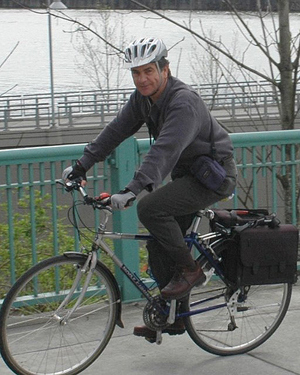 National bicycle and pedestrian expert, Michael Ronkin, was yesterday’s keynote speaker at the Michigan Transportation Planning Association and Michigan Association of Regions conference titled “Planning for Change in an Uncertain World.” The 34th annual conference started on July 13 and will conclude on the 16 and is being held in East Lansing.
National bicycle and pedestrian expert, Michael Ronkin, was yesterday’s keynote speaker at the Michigan Transportation Planning Association and Michigan Association of Regions conference titled “Planning for Change in an Uncertain World.” The 34th annual conference started on July 13 and will conclude on the 16 and is being held in East Lansing.
Yesterday’s speakers focused entirely on designing walkable and bike-able communities. Rory Neuner, State Network Manager for the Safe Routes to Schools National Partnership presented on Complete Streets while League of Michigan Bicyclists’ Executive Director Rich Moeller presented a Bikeability Assessment Guide for communities. Additionally, Meridian Township Treasurer, July Brixie highlighted her communities new Bicycle Parking Ordinance while MDOT’s Josh DeBruyn debunked liability concerns many communities have about putting in pedestrian and bicycle facilities. The nonmotorized sessions were rounded out by Dave Morena who discussed Road Diets and Wes Butch of DLZ Corp talked about roundabouts and the need to balance pedestrian mobility against motorist safety.
Following these breakout sessions, Tim Potter, manager of MSU Bikes Service Center, led a group of about 15 bikers on a tour across campus and through E. Lansing and Lansing.
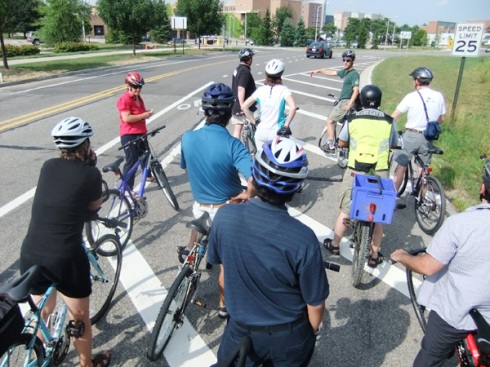 The group of bikers included not only Ronkin and Potter, but also a number of engineers, planners and politicians. Rich Moeller, Executive Director of the League of Michigan Bicyclists, said “It’s different when you see it by bike versus in your car,” “It’s hands-on (and) it allows them to get on their bike and see some of the issues bicyclists are facing. It helps them as planners and engineers to design things.”
The group of bikers included not only Ronkin and Potter, but also a number of engineers, planners and politicians. Rich Moeller, Executive Director of the League of Michigan Bicyclists, said “It’s different when you see it by bike versus in your car,” “It’s hands-on (and) it allows them to get on their bike and see some of the issues bicyclists are facing. It helps them as planners and engineers to design things.”
A short interview with Michael Ronkin was featured in today’s State News.
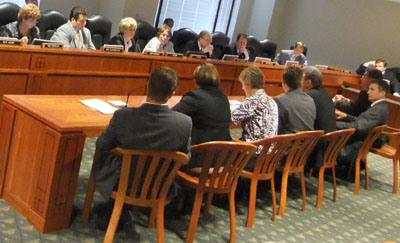
R to L: A panel of supporters including the County Road Association of Michigan, Michigan Environmental Council, Michigan Fitness Foundation, Michigan Municipal League, Michigan Trails and Greenways Alliance, AARP and Representative Jon Switalski testifying in support of HB 6151 and 6152.
The House Transportation Committee voted unanimously to pass HB 6151 and HB 6152 out of committee, with recommendations. This is a big success for Complete Streets, and the Coalition would like to thank all of the stakeholders who worked hard to negotiate a bill that was eventually able to garner such strong support. We would especially like to thank Rep. Wayne Schmidt for his leadership on this issue, as well as Rep. Pam Byrnes, Rep. John Switalski and their staffs, who put a lot of effort to achieve this victory. In hectic fashion, the final drafts of the bills were being revised right up to the last minute, modified to reflect the negotiations made between all parties involved. As Chairwoman Byrnes said, reflecting on the compromises reached, “This bill is not what everybody wants, but it’s a good step forward.”
As the result of negotiations MML, SEMCOG, MDOT and CRAM, many of whom had previously only supported the bills in concept, are now strong supporters of the legislation. The support of these organizations, in addition to the support of most of the GOP members of the committee, bodes well for the future of the bills.
The final revision of the bill no longer requires local road agencies or municipalities to pass their own Complete Streets policies. MDOT, however, is still required to pass a Complete Streets policy, along with a ‘model’ policy for municipalities and counties. As Rep. Switalski said, this version of the bill gives “cities, and locals more say when dealing with transportation policy.” The final bill also gives the Complete Streets Advisory Council a much stronger role in the planning process, allowing them to advise MDOT on the adoption of Complete Streets policies.
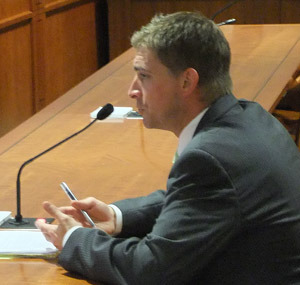
Bill sponsor, Representative Jon Switalski, makes the case for Complete Streets in Michigan before the House Transportation Committee on June 24th, 2010. The Committee went on to vote unanimously in support of the legislation.
Felicia Wasson from AARP used her brief testimony to rightly note that this is “only the beginning - a first step” for Complete Streets. According to the revision, Complete Street policies must consider the “varying mobility needs of all legal users of the roadway, of all ages and abilities.” This language does indeed represent a great first step towards ensuring that everyone is entitled to use roadways safely and conveniently.
The bills will now be referred to the House floor for a second reading, followed by a vote by the full House of Representatives. Rep. Byrnes expects that the bills will be voted on by the House relatively soon. After that, they are on to the Senate committee. It’s important to keep the energy and enthusiasm alive as the bills move forward - look for an updated action alert on our Take Action page in the next few days.
(For a complete look at the process the bills will follow as they become law, download a PDF copy of the Michigan Citizens Guide to State Government)
The Coalition would like to once again thank everyone who has worked with us to see that these bills get passed. Let’s use today’s success as a springboard to redouble our efforts, and push these important bills out of the House and through the Senate!
Additionally, League of American Bicyclists, Alliance for Biking and Walking, and the National Complete Streets Coalition all featured the efforts of Michigan’s Complete Streets movement on their blogs today.
Many more organizations and individuals provided testimony in support of Compete Streets that was entered into the record at the committee meeting as well. The following is list of links to .pdfs of those testimonies.
- Sarah Panken, Active Communities Coordinator for the Michigan Fitness Foundation
- Susan Hargter, Cyclesafe, Inc.
- Robert Prud’homme, LEED for Neighborhood Development, USGBC- Detroit Regional Chapter
- Barbara Kramer, Candidate for Dickinson County Comissioner
- MC Rothhorn, Mid-Michigan Environmental Action Council
- Jim Briggs and Carolyn Grawi, Ann Arbor Center for Independent Living
- Frank Lynn, Concerned Citizens for Improved Transit
- Dave Bulkowski, Disability Advocates of Kent County
- Gary Howe
- Michael Aughenbaugh, Revex, Inc.
- Steven A Roach
- Michael Maisner, Michigan Fitness Foundation
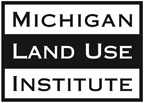 Thanks to Brian Beauchamp of the Michigan Land Use Institute for his recent blog post supporting the Complete Streets legislation currently before the House Transportation Committee. In addition to traveling to Lansing to voice support before the House Transportation Committee, MLUI posted a call to action on their blog earlier this week.
Thanks to Brian Beauchamp of the Michigan Land Use Institute for his recent blog post supporting the Complete Streets legislation currently before the House Transportation Committee. In addition to traveling to Lansing to voice support before the House Transportation Committee, MLUI posted a call to action on their blog earlier this week.
 We would also like to thank the Michigan League of Conservation Voters for their recent article expressing support of HB 6151 and 6152. “The Michigan House is pedaling good policy in this case,” said Lisa Wozniak, executive director of the Michigan League of Conservation Voters
We would also like to thank the Michigan League of Conservation Voters for their recent article expressing support of HB 6151 and 6152. “The Michigan House is pedaling good policy in this case,” said Lisa Wozniak, executive director of the Michigan League of Conservation Voters
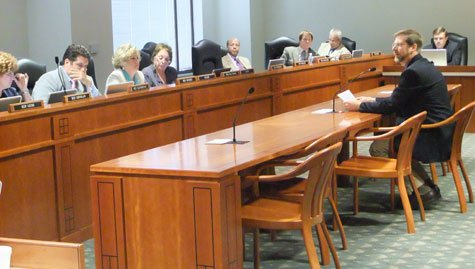
Michigan Complete Streets Coalition member, Norm Cox of the American Society of Landscape Architects used his testimony to state that HB 6152 and 6152 is "working to make amends for the lopsided transportation investments of the last 50-60 years," adding, "it's not taking money away, but redistributing it based on changing priorities."
The second House Transportation Committee hearing on Complete Streets legislation, HB 6151 and 6152, saw the room once again packed with supporters of the policies. The legislation - which seeks to move Michigan away from auto-centric road designs and meet the needs of all roadway users - has attracted strong support from a broad range of advocates. A few of the groups represented at today’s hearing included: The American Heart Association, Crim Fitness Foundation and Citizens for a Safe Community.
The coalition would like to extend thanks to all those who spoke at the meeting today, as well to those that offered written testimony. Chairwoman Byrnes (D - Dist. 52) indicated she plans to hold a vote on the bills next week, and with some organizations like SEMCOG and MML still supporting the bill in concept only, it is important that the committee members continue to hear vocal support for these specific policies.















